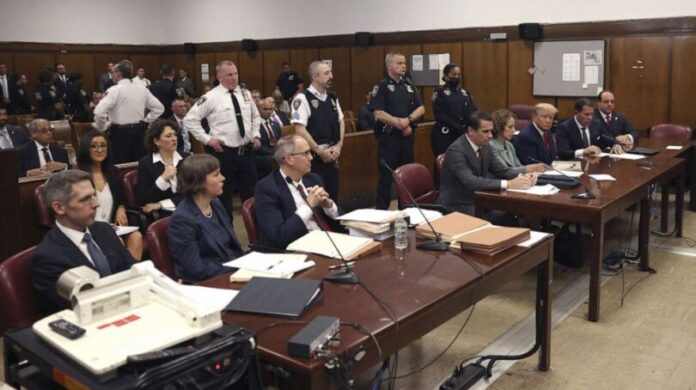
By Stacy M. Brown, NNPA Newswire Senior National Correspondent
Denver district court is considering a lawsuit to prevent former President Donald Trump from appearing on Colorado’s 2024 ballot due to his alleged involvement in the U.S. Capitol attack on January 6, 2021. Colorado Judge Sarah Wallace recently rejected Trump’s attempt to dismiss the case, which was filed last month on behalf of six voters in the Denver district.
The lawsuit is based on Section 3 of the 14th Amendment. It argues that people who have participated in insurrection or rebellion after promising loyalty to the Constitution should not be able to hold office. Trump, who is currently facing 91 criminal charges after four federal and state indictments, could potentially receive a prison sentence of over 800 years. The lawsuit accuses him of breaking his promise as president by attempting to overturn the 2020 election, which ultimately led to the January 6 insurrection.
Citizens for Responsibility and Ethics in Washington (CREW), along with several law firms, filed a lawsuit on behalf of six voters from the Republican Party and independent voters.
Eric Olson, from CREW, began his testimony by explaining what Trump did before January 6. This included a tweet he sent in December 2020 asking his supporters to come together in Washington, D.C. Olson highlighted Trump’s frequent mentions of January 6. He stated that Trump motivated his followers by making false allegations of election fraud.
Olson showed a video clip of Trump’s speech on the Ellipse on January 6. In the speech, the former president said, “Let’s go to the Capitol.” He argued that Trump was acutely aware of the influence of his words and that his speech before the Capitol riot exacerbated the situation.
Olson also pointed to a post-speech tweet where Trump criticized then-Vice President Mike Pence, asserting that Pence lacked “the courage to do what he should have done.” That followed a clip of Trump supporters outside the Capitol chanting, “Hang Mike Pence.”
“We are here because Trump claims, after all that, that he has the right to be president again,” Olson asserted. “But our Constitution, the shared charter of our nation, says he cannot do so.”
During his opening arguments, Scott Gessler, Trump’s legal representative, decried the lawsuit as “antidemocratic” and said Monday’s hearing was “politicized.” Gessler argued that Trump used the word “peace” several times during his speech at the Ellipse on January 6, as well as in his tweets on the same day. He claimed that the lawsuit wants the court to approve the January 6 Committee’s report, which he described as a biased and harmful report.
Officer Daniel Hodges, from the District of Columbia Metropolitan Police Department, testified about his terrifying ordeal during the Capitol attack. Hodges described observing Capitol rioters donning tactical gear, an occurrence that left him “very uncomfortable.” He suffered many injuries when rioters attacked the Capitol, including bruises, a head injury, cuts on his face, and bleeding from his mouth. Hodges also attested that a rioter attempted to gouge his eye. He remembered protesters yelling that the election was stolen and encouraging others to fight for Trump. They also criticized law enforcement for being on the wrong side of history.
During his remote testimony, Rep. Eric Swalwell, a Democrat from California, stated that Trump had clearly indicated before the 2020 election that he would not acknowledge the results if he was not the winner. Swalwell claimed that Trump escalated his rhetoric after legal challenges to the election results were dismissed. He told the lawmakers’ increasing worry when Trump announced, “We’re going to the Capitol” in his Ellipse speech. He then described the distressing experiences of himself and his colleagues as rioters entered the Capitol.
In her ruling last week, Wallace dismissed Trump’s argument that Congress, not the courts, can handle questions about ballot eligibility. She disagreed with Trump’s statement that state election officials cannot enforce Section 3 of the 14th Amendment.
Wallace argued that the clause allows Congress to remove a constitutional disability if a person is disqualified. However, the clause does not specify which government body would decide on such disability initially.
“The Court notes, however, it would be strange for Congress to be the only entity that is empowered to determine the disability and then also the entity that is empowered to remove it,” Wallace wrote. “States can, and have, applied Section 3 pursuant to state statutes without federal enforcement legislation,” Wallace said.
The judge’s ruling followed a decision by Chief U.S. District Judge Philip A. Brimmer to dismiss Trump’s request to move the Colorado ballot case to federal court. In a four-page order, Brimmer, a nominee of George W. Bush, stated that Trump, who was found responsible for sexually assaulting a journalist by a civil jury this year, did not properly follow the necessary procedures to involve Colorado’s Democratic Secretary of State, Jena Griswold, or get her approval to transfer the case to federal court. As a result, Trump’s attempt to move the case is considered “defective.”
Trump is also facing other challenges to his eligibility to appear on the 2024 presidential ballot. The Minnesota Supreme Court will hear arguments on Thursday concerning a lawsuit to remove Trump from the ballot in Minnesota. The current lawsuit also references a lesser-known provision in the 14th Amendment of the Constitution. Similar legal challenges are underway in New Hampshire, Arizona, and Michigan.


